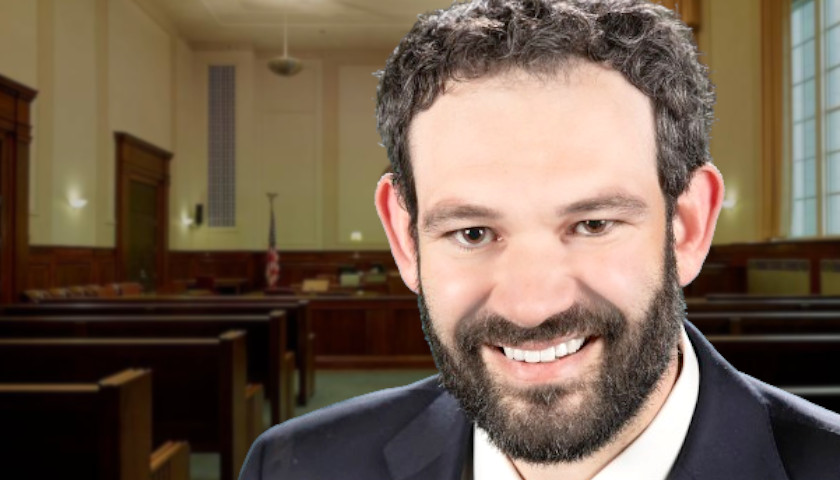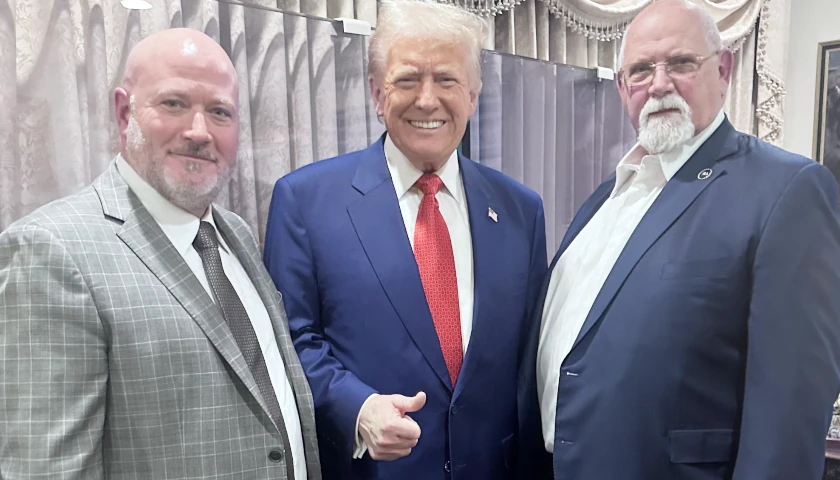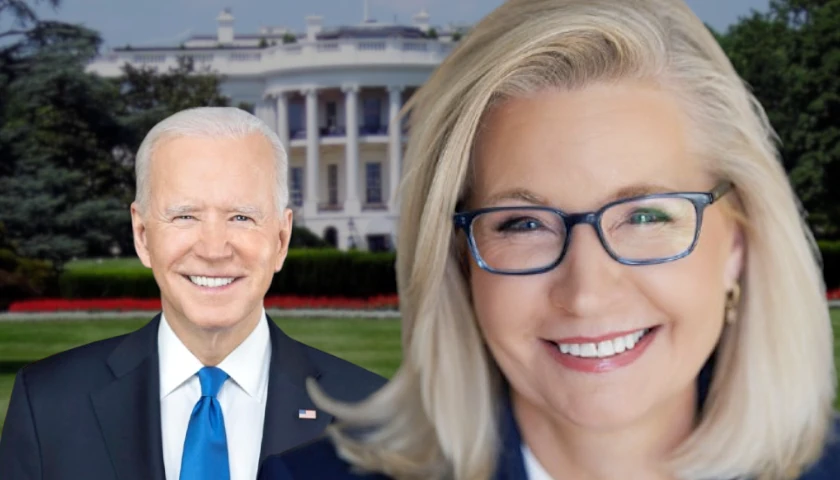The State Bar of Arizona has been aggressively pursuing disciplinary charges against attorneys who challenged alleged election irregularities and illegalities in 2020 and 2022. Proceedings against State Representative Alex Kolodin (R-Scottsdale) recently concluded with Kolodin accepting an agreement that would allow him to keep his law license, instead serving probation for 18 months.
The Arizona Bar charged Kolodin (pictured above) with several rules often used to disbar conservative attorneys. As part of the agreement, Kolodin admitted his actions violated Rule 42, ERs 3.1 and 8.4(d) of the Arizona Bar’s Rules of Professional Conduct. ER 3.1 prohibits attorneys from bringing “frivolous” lawsuits, and 8.4(d) prohibits attorneys from “engag[ing] in conduct that is prejudicial to the administration of justice.”
Kolodin was not required to admit any specifics of wrongdoing, and the agreement did not explain how he violated the two ethical rules, which is unusual in an Agreement for Consent by Discipline.
Kolodin’s discipline is known as an “admonition.” He will also be required to pay the costs and expenses of the proceeding within 30 days and take certain Continuing Legal Education courses within 18 months. The agreement stated that aggravating factors were found, including “multiple offenses” and “substantial experience in the practice of law.” Kolodin has practiced law for 10 years. In previous bar disciplinary cases, the Arizona Bar often said 10 years was “too inexperienced” when handing out discipline.
The Arizona Bar primarily cited three cases Kolodin filed along with other co-counsel: Aguilera v. Fontes (Aguilera I), Aguilera/Drobina v. Fontes (Aguilera II), and Bowyer v. Ducey, which he filed with famed attorney Sidney Powell.
In Aguilera I, plaintiff Laurie Aguilera claimed she was given a sharpie to complete her ballot, and the ink bled through, causing her ballot to be rejected. In the complaint, Kolodin also asserted, “Under Arizona law tabulation machines must be certified to have perfect accuracy.” He dismissed the complaint shortly after it was filed, unable to obtain a transfer of judge.
Maricopa County Superior Court Judge Margaret Mahoney, who presided over both Aguilera cases, was up for retention election in 2020 yet refused to recuse herself from 2020 election cases, prompting a judicial complaint from A.S. Martin, a retired attorney. After the complaint was filed, it was reported that Maricopa County Superior Court Judge Joan Sinclair, who was up for retention election in 2022, recused herself a few days ago from a 2022 election-related case for that reason.
In Aguilera II, Kolodin alleged, “When voters follow the instructions of election officials, those tabulation machines are supposed to automatically scan and tabulate the ballots of election-day voters with perfect accuracy.” The disciplinary agreement said, “Respondent informed the court that Plaintiffs anticipated calling an expert, Jim Sneeringer, Ph.D,, to testify ‘that the voting system used by the county was designed to automatically read ballots and count the votes as designated and then tabulate the results. Based on his experience and education, this particular voting system has previously been found to reject correctly marked ballots, which would be an error or failure on the part of the system.’”
During an evidentiary hearing, Mahoney, who is now retired, refused to allow Sneeringer to testify, since the tabulator machine he intended to discuss, Dominion Democracy 5.5.A, which had been rejected by the State of Texas, was slightly different from the one in use in Arizona, Dominion Democracy 5.5.A. Mahoney also dismissed the count, alleging that Maricopa County violated the state’s Election Procedures Manual (EPM) by not allowing public access to facilities where the county conducted the electronic adjudication of votes. Violation of the EPM is a class 2 misdemeanor. The Arizona Court of Appeals dismissed Kolodin’s appeal, claiming it lacked jurisdiction.
The agreement described Bowyer v. Ducey next, stating that Kolodin represented plaintiffs who alleged “massive election fraud” “for the purpose of illegally and fraudulently manipulating the vote count to manufacture an election of Joe Biden … and down ballot democrat candidates …” and sought to eliminate “the mail ballots from counting in the 2020 election,” or to disqualify Arizona’s electors “from counting toward the 2020 election,” or an order that the Arizona electors “be directed to vote for President Donald Trump.”
U.S. Federal District Court Judge Diane Humetawa, a former President Barack Obama-appointed judge, granted the defendants’ Motion to Dismiss in the case, declaring that if the relief sought was granted, “millions of Americans who exercised their individual right to vote in the 2020 General Election would be utterly disenfranchised.” Humetawa claimed the “allegations are sorely wanting of relevant or reliable evidence.”
She dismissed all of the evidence. “Plaintiff append over three hundred pages of attachments, which are only impressive for their volume,” the ruling said. “The various affidavits and expert reports are largely based on anonymous witnesses, hearsay, and relevant analysis of unrelated elections.”
Humetawa labeled the evidence “gossip and innuendo,” and said the Republican county chairs Kolodin represented as plaintiffs lacked standing because they were not up for election.
Finally, the agreement also mentioned an unsuccessful lawsuit Kolodin filed on behalf of two Arizona legislators. Kolodin represented State Senator Anthony Kern (R-Glendale) and then-legislator Mark Finchem in a defamation complaint against then-legislator Charlene Fernandez, who was the Democratic leader of the Arizona House, over a letter she co-authored to the United States Attorney General and the FBI asking them to criminally investigate Kern and Finchem for their actions expressing concern that there was illegal activity in the 2020 election. She accused the pair of being a part of an “attack on our country,” and said, “For weeks prior to the breach, a group of Republican Arizona legislators and legislators-elect publicly advocated for the overthrow of the election results which encouraged precisely the kind of violent conduct that we witnessed.” She said they “actively encouraged the mob, both before and during the attack on the Capitol.”
Representative Paul Gosar (R-AZ-04) was added as a plaintiff to the complaint. Yuma County Superior Court Judge Levi Gunderson, whose previous experience includes serving as assistant legal defender with the Yuma County Legal Defender’s Office, dismissed the complaint, saying Fernandez had a First Amendment right, and awarded attorneys fees and costs against the plaintiffs, but not against the attorneys. A bar complaint was filed against Kolodin afterward.
The 65 Project, which files complaints against election attorneys who challenged the 2020 election results over concerns of illegal activity, initially filed a complaint against Kolodin. Several progressive attorneys in leadership positions at the Arizona Bar also filed complaints, including LGBT activist Amelia Craig Cramer, a former bar president, and Robert McWhirter. McWhirter, a member of the board of governors, frequently attacked former Maricopa County Attorney Andrew Thomas, whom the Arizona Bar ultimately disbarred in 2012 related to his efforts with former Maricopa County Sheriff Joe Arpaio rooting out corruption within the Maricopa County Supervisors and stopping illegal immigration. Others who filed complaints against Kolodin included Diane Post, a progressive activist and legal director for Secular AZ, and Roxana Bacon, an immigrant activist and Democratic operative who served as co-chair on the Phoenix mayoral campaign of Democrat Terry Goddard.
Last week, the Arizona Bar found probable cause to file formal disciplinary charges against three election attorneys who represented Kari Lake. Those attorneys will also have an opportunity to accept a lesser sentence in exchange for entering into an agreement for discipline by consent.
State bar proceedings are ongoing against multiple election attorneys around the country, many arising out of bar complaints filed by The 65 Project. The State Bar of California went after Trump’s former attorney, John Eastman, seeking to disbar him for his work representing Trump in the 2020 election challenges. He is awaiting the California disciplinary judge’s decision, who is expected to disbar him. The District of Columbia Bar is seeking to disbar Trump’s DOJ appointee Jeffrey Clark for his role in the 2020 election challenges, drafting a memo to Georgia election officials advising them of their options, which was never sent.
While some attorneys like Kolodin have agreed to settlements with state bars that don’t specifically require them to denounce their election integrity work, at least one attorney has agreed to renounce her former efforts. Trump’s former attorney, Jenna Ellis, entered into a settlement agreement with the Colorado Bar that required her to admit she “spread misrepresentations” about election fraud. She said she failed to do her “due diligence,” saying if she had known then what she knew now, she wouldn’t have represented Trump. In exchange, she received a censure.
– – –
Rachel Alexander is a reporter at The Arizona Sun Times and The Star News Network. Follow Rachel on Twitter / X. Email tips to [email protected].








